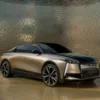Is Tesla in trouble? There has been a lot of talk lately that Tesla is in trouble – the boycott, the drop in sales, Musk’s controversy… All of this is making headlines, especially in left-wing media outlets that want to diminish its influence. But the truth is completely different. Tesla is not just a car company. It is becoming a technological titan that may one day transform the entire mobility industry – and in a way that we can hardly imagine today.
Or is it Tesla In trouble? Those who follow the events know that Tesla has long been no longer just a manufacturer of electric cars. Over the past six months, we have heard at investor meetings, which were broadcast live on the X and YouTube platforms, that the company's main product today is something completely different: artificial intelligence and robotics.
It may sound incredible, but Tesla's biggest focus in the future will not be on cars, but on the humanoid robot Optimus. It is expected to soon become a key part of factory production and completely transform the way we understand work and productivity.
But even though cars are no longer the primary focus, Tesla is still impressive in this area. The Model Y was the best-selling car in the world last year. Not just the best-selling electric car, but the best-selling car in general! And this year, we're in for even bigger changes.
The future is autonomous: the cybercab is on the doorstep!
One of Tesla's biggest advantages is FSD – Full Self-Driving, which is improving not only with upgrades, but with the kilometers traveled every day by millions of Tesla vehicles. In some US states, it already operates without legal restrictions, meaning that drivers become mere passengers.
The Cybercab, a fully autonomous vehicle with no steering wheel or pedals, will hit the roads this year. It will usher in a new era of mobility – one where drivers are no longer needed. If that's not a revolution, then I don't know what is.
Tesla's Supercharger: The Biggest Competitive Advantage
One of Tesla's biggest weapons is their network of charging stations. Supercharger. It's not just the largest network of fast charging stations in the world, it's also the most advanced. You pull up, your car connects, charging begins - no apps, no cards, no frustration.
Other automakers are just now trying to establish something similar, but they are years, if not decades, behind. This is the kind of competitive advantage that is almost impossible to catch up with.
Cars that improve over time
Another key advantage of Tesla is its constant software upgrades. While for most cars, an upgrade means a new color or different knobs, Tesla literally improves the car with updates. FSD is getting smarter, energy consumption is being optimized, new features are being added …
This means that a Tesla car doesn't lose value just because it's a few years old. On the contrary - it gets even better with upgrades. This is a concept that the classic car industry simply can't imitate. Ok. Now let's ask ourselves?! Is Tesla in trouble?
Tesla is the largest technology laboratory on wheels
Tesla isn't just a car company—it's a technological revolution on four wheels. Their navigation is another thing that sets them apart from the competition. While drivers of other electric vehicles still have to calculate their range and rely on confusing apps, Tesla offers accurate and intelligent navigation that adapts in real time.
But the biggest revolution is yet to come: with the integration of artificial intelligence Grok Tesla will enable fully verbal communication with the vehicle. Not as an assistant that only understands you if you speak like a robot, but as a true digital companion that understands the context and your wishes.
Tesla is becoming invincible thanks to humanoid robots
Humanoid robots will start working in Tesla factories this year OptimusThis will dramatically increase productivity, reduce production costs, and further increase the company's profitability.
For comparison: Tesla makes around 10,000 euros in profit on each car sold, while Toyota only makes 1,500 euros. With the introduction of the robot Optimus this profit could increase to more than 15,000 euros per vehicle.
This means that Tesla is no longer competing with traditional car companies – it is competing with the future.
Sales drop? Just waiting for a new model!
One of the main arguments Tesla skeptics is a drop in sales in the last quarter of 2024 and the beginning of 2025. But the reason is simple: people are waiting for a new model Y.
No one wants to buy the old version if they know an updated version is coming. Currently, only Launch Edition, which costs around 60,000 euros, and the classic version will only be available later, which will of course increase demand.
In addition, Tesla is preparing two more big bombs this year: mysterious Q model, which is estimated to cost around 30,000 euros, and the first cybercabe.
Conclusion: Tesla doesn't have a problem – everyone else has a problem!
All classic car manufacturers face major difficulties in transitioning to an electric future. Volkswagen, Ford, GM ...all are struggling to adapt to the new era of mobility. But Tesla is years – if not decades – ahead of them.
Cybertruck? It's not a vehicle for Earth, but for Mars.
Model Y? The best-selling car in the world.
Cybercab? Driverless mobility.
Optimus? A robot that will change the industry.
Tesla is not failing. Tesla is redefining the future. The only question is: who will be able to catch up with her?




